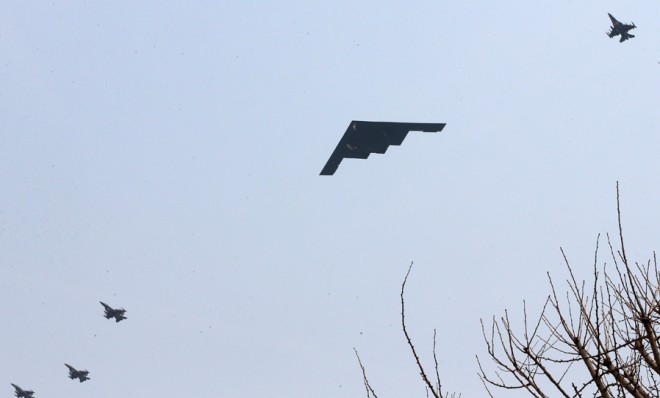Why the U.S. is flying B-2 stealth bombers over Korea
Pyongyang's increasingly bellicose rhetoric has not gone unanswered

A free daily email with the biggest news stories of the day – and the best features from TheWeek.com
You are now subscribed
Your newsletter sign-up was successful
North Korea has been boasting all week about its military muscle. So on Thursday, the United States flexed its own muscles by flying two B-2 stealth bombers over South Korea.
The American military said the nuclear-capable bombers made the practice run to "provide extended deterrence to our allies in the Asia-Pacific region" and demonstrate "the United States' ability to conduct long range, precision strikes quickly and at will," according to the New York Times.
The U.S. practice run comes mere days after North Korea threatened to attack Hawaii, Guam, and the U.S. mainland. Pyongyang has become increasingly hostile since tough new sanctions were passed by the U.N. Security Council as punishment for the hermit kingdom's nuclear test on February 12.
The Week
Escape your echo chamber. Get the facts behind the news, plus analysis from multiple perspectives.

Sign up for The Week's Free Newsletters
From our morning news briefing to a weekly Good News Newsletter, get the best of The Week delivered directly to your inbox.
From our morning news briefing to a weekly Good News Newsletter, get the best of The Week delivered directly to your inbox.
The two planes left a U.S. military base in Missouri, dropped inert munitions on a South Korean island, and then flew back home. While the U.S. military may well have done something like this before, this is the first time the United States has publicly announced it, which, according to the New York Times, is likely to agitate Kim Jong-Un:
After suffering from the American carpet-bombing during the 1950-53 Korean War, North Korea remains particularly sensitive about American bombers. It keeps most of its key military installations underground and its war cries typically reach a frenetic pitch when American bombers fly over South Korea during military exercises. [New York Times]
This mission could easily be interpreted as a sign that Washington is looking to get tougher on Kim Jong-Un. "The intensity of the rhetoric is a lot hotter, the uncertainty is higher," U.S. diplomat Bill Richardson told CBS News, underscoring that the young leader seems even more unpredictable then his late father, the very unpredictable Kim Jong-Il.
Civilians on the Korean border don't seem worryingly fazed, though. "Tension rises almost every year when it's time for the U.S.-South Korean drills to take place, but as soon as those drills end, things quickly return to normal," Sung Hyun-sang, president of an apparel manufacturer that employees 1,400 North Koreans in the city of Kaesong, told the AP.
While the rhetoric so far hasn't led to violence, the New York Times points out that "under a mutual defense treaty, Washington is obliged to intervene should a local skirmish expand into a full-blown war."
A free daily email with the biggest news stories of the day – and the best features from TheWeek.com
Keith Wagstaff is a staff writer at TheWeek.com covering politics and current events. He has previously written for such publications as TIME, Details, VICE, and the Village Voice.
-
 Quiz of The Week: 14 – 20 February
Quiz of The Week: 14 – 20 FebruaryQuiz Have you been paying attention to The Week’s news?
-
 The Week Unwrapped: Do the Freemasons have too much sway in the police force?
The Week Unwrapped: Do the Freemasons have too much sway in the police force?Podcast Plus, what does the growing popularity of prediction markets mean for the future? And why are UK film and TV workers struggling?
-
 Properties of the week: pretty thatched cottages
Properties of the week: pretty thatched cottagesThe Week Recommends Featuring homes in West Sussex, Dorset and Suffolk